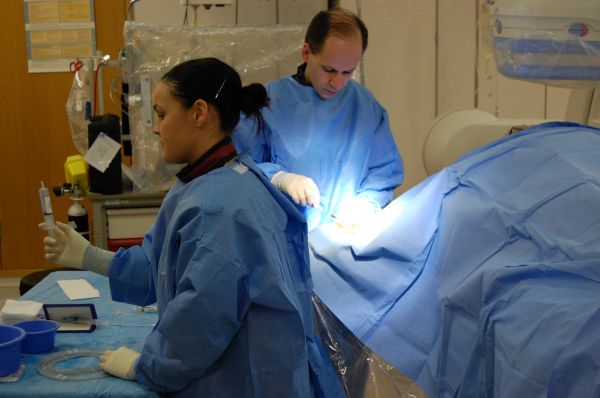
More than 600 heart attack patients are currently being invited to participate in a research study which is assessing a new treatment approach that is intended to restore blood flow to the small vessels in the heart.
T-TIME is a new heart research study which is being led between the University of Glasgow, the Golden Jubilee National Hospital and NHS Greater Glasgow and Clyde.
The project is funded by the Efficacy and Mechanism Evaluation (EME) Programme, a Medical Research Council (MRC) and National Institute for Health Research (NIHR) partnership. More than 150 patients have been enrolled across the UK, with 113 patients at the Golden Jubilee National Hospital and five other centres, including Freemans Hospital, University of Southampton, Leeds General Infirmary, Glenfield General Hospital St Bartholomew's Hospital, London and Wythenshaw Hospital all now recruiting individuals to the trial. Overall 618 patients with an acute myocardial infarction (heart attack) will be invited to participate in eight centres around the country.
The study involves a giving a drug which is intended to restore blood flow to the small vessels in the affected part of the heart. The standard approach is to open up the blocked heart artery and place a stent, however, currently, there is no treatment for multiple blockages in the small vessels.
The drug breaks down micro blood clots and restores blood flow to the multiple branches of the affected artery.
Currently the British Heart Foundation reports that survival from coronary heart disease is improving generally, but not in younger women.
Professor Colin Berry Professor of Cardiology and Imaging at the Institute of Cardiovascular and Medical Sciences and Research Director for the Golden Jubilee, said: "The current treatment for a heart attack patient is to re-open the blood vessel and place a thin metal tube, called a stent. This 'standard of care' treatment is very successful for the affected artery, however, the many smaller branches remain blocked in about half of all patients. This residual heart injury places patients at risk of heart failure days later and in the longer term. We have no specific treatments for this problem, reflecting an unmet need.
"We have developed a new treatment approach that involves giving a low dose of a 'clot-breaking' drug directly into the affected artery at the time of the heart attack. In the T-TIME study, we will gather information to assess whether or not this treatment reduces the amount of heart injury, and whether it is safe."
One of the first patients to receive the treatment at the Golden Jubilee National Hospital was Catherine Gardiner, a 70 year old grandmother, who suffered an unexpected heart attack while attending church in July this year.
Discussing her case, Catherine said: During the service I felt as though I had terrible, terrible chest pains, and I knew something was not right. At first I thought I was having an asthma attack, but as it went on I realised it was something else. My son lives in the next building so I went straight to his house and he phoned an ambulance. I was driven straight to the Golden Jubilee and had a stent put in before being taken up to the ward.
"Having never experienced anything like this or had any major health concerns before, I can only comment on my experience, but the team who took care of me during the T-Time Trial were absolutely fantastic and I can't thank them enough for what they've done for me. Now, I'm eating better and exercising more, and just celebrated my 70th birthday with my family. I'm taking every day as it comes, getting back to normal and I am so grateful to the team that I'm still here."
More information on the trial can be found here https://clinicaltrials.gov/ct2/show/NCT02257294
News Archive
Please browse through our Academy, CfSD and Hotel Press releases.


